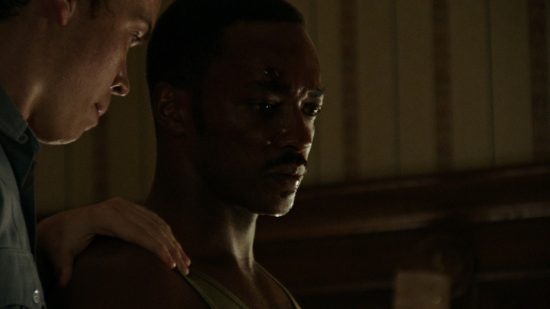Review: Detroit – “Kathryn Bigelow is back with a vengeance”
In the light of the world’s current political climate and especially after the recent despicable manifestation of white supremacist violence in Charlottesville, the release of Detroit couldn’t have been more timely and poignant. Brutal, unsettling and insanely taut, this gripping and compelling reconstruction of the racist murders that occurred during the Detroit riots in the summer of ‘67 will make audiences’ blood stir.
Director Kathryn Bigelow and screenwriter/producer Mark Boal are back in business together once again after winning two Oscars each for The Hurt Locker in 2008 and getting nominated for their collaboration on 2012’s Zero Dark Thirty. And it’s no surprise their teamwork keeps paying off with the perfectly fined-tuned combination of Bigelow’s dynamic visual storytelling and Boal’s strikingly observed and researched account of controversial real-life events.
Detroit reminds us what a powerful tool cinema can be as it sheds light on events that deserve way more respect than being reduced to history’s footnotes. If anything, what happened over that infamously heated summer of 1967 in the Michigan city famous for the automobile industry and Motown music, needs to be brought back into the spotlight for the younger generations.
Besides Charlottsville, the recent racially charged tragedies in the US involving the police – which have ignited the “Black Lives Matter” movement – prove how we fail to learn from our mistakes. That’s why a movie like Detroit is pivotal to awaken our social awareness and help us realise how we can’t let history repeat itself.
The film focuses on the terrifying evening during the period of civil turmoil that beset the city of Detroit in the summer of 1967 as the escalating American engagement in the Vietnam War and decades of racial injustice and repression were shaking the nation. Race-related discrimination and disparity in housing, education and growing unemployment aggravated the ongoing discontent of a country whose major cities were progressively drowning in socio-political unrest and the manifestations of rage that came along with it.
Two nights into the Detroit riots, gunshots were reported coming from the Algiers Motel in the proximity of a National Guard post. The alert prompted the Detroit Police Department, the Michigan State Police, the Michigan Army National Guard and a local private security guard to seize the Motel’s premises. However, what was supposed to just be a search for the alleged guns resulted in a nightmarish night of violence and psychological abuse perpetrated by a group of racist and morally corrupt policemen.
A few Motel guests – mostly African-Americans – were interrogated with vicious intimidation tactics, including a disgusting “death game” in order to obtain a confession about who allegedly fired the gun that was heard going off by the National Guard. Said game entailed taking one person at a time into a nearby room for a one-on-one confrontation that would end with a make-believe killing of that person in order to terrify the rest into confessing. However, whilst no gun was ever found, by the end of the night three unarmed young men were actually shot point blank, and several other men and women were brutally beaten.
Delving any deeper into the story details would ruin the level of tension you’re bound to experience whilst the events unfold on screen and you come to the chilling realisation that what you’re watching happened in real life. Yet the most staggering fact is the lack of clarity on how things went down and the filmmakers underline how their reconstruction is still a theory based on their thorough research and collection of testimonies from those who survived and are still alive.
The film’s essential purpose is to actually bring this shameful and often forgotten episode of American history back to the forefront and under the spotlight. As clearly spelt out by the film’s tagline: “it’s time we knew”. Both Boal’s script and Bigelow’s direction immerse us deep into the action, making us experience front and center the victims’ unease that progressively morphs into sheer terror.
Their work is consolidated by the outstanding cast they have gathered for the occasion, mostly newcomers and rising stars, some of which happen to also be some of the best young British talent working today. John Boyega (Star Wars Episode VII: The Force Awakens) delivers an extremely understated yet deeply affecting performance as the security guard who decides to go check on the Tangiers Motel’s disturbance. Will Poulter (The Revenant) steals the show as the viciously racist, pure evil officer Krauss who leads the Motel raid, never falling into gimmicky over-the-top territory whilst mastering the subtlety of the role. Whilst amongst the forced hostages Algee Smith stands out for his layered emotional work as a soul band’s lead singer who happens to be in the wrong place at the wrong time.
Kathryn Bigelow is back with a vengeance, confirming once again that she’s one of the great filmmakers of our time and that Hollywood needs more female auteurs. It’s impossible not to feel indignation as we witness these despicable events and not just for what happened back then but especially for what still happens today. The entire cast is beyond brilliant, capturing a sense of authenticity that’s not easy to experience when it comes to portraying true stories adapted for the screen. And whilst it’s easy to single out some names, this amazing group of actors makes you wish the Academy introduced a best ensemble award like SAG, because even the smallest role in this talented bunch is worthy of praise. Detroit is an intensely gripping film whose relevance and urgency make it one of the essential films of the year.











